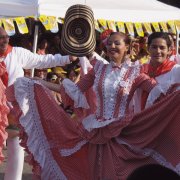10 joys and challenges of having a Colombian partner
There is no doubt that Cross-Cultural Relationships can be challenging, not only due to language barriers or in cases with long-distance but also because of different cultural norms, traditions, and customs.
Having a Colombian partner is one of the reasons why many people come to the country to learn Spanish and to learn more about our culture. We asked some women and men from North America and Europe who have – or have had- Colombian partners about their joys and challenges of dating or living with a Colombian.
The joys
Before starting, it is important to note that these are not stereotypes but generalizations. Below are 10 favorable characteristics people tended to notice about their Colombian partner or Colombian culture:
1. They are happy people
Colombians are generally seen as friendly, happy and positive people. You normally see them smiling, singing, dancing. Their happiness is contagious.
2. They are grateful
Colombians have the ability to enjoy simple things and to be grateful for almost anything. It might be due to their strong religious background, due to decades of violence and internal conflict, due to the many social and economic problems, or a combination of these.
3. They are spontaneous and authentic
Colombians have the ability to live and enjoy the present moment. Colombians are generally spontaneous and authentic; they are also very expressive you can easily discern their emotions even when they are not talking.
4. They are creative and positive
Colombians tend to see the glass half full, they are very resourceful and always find ways to overcome any difficulty. Never say to a Colombian they can’t do something, they will prove you wrong!
5. They are talkative and have a good sense of humor
Colombians love making jokes, they love sarcasm and they love talking. Colombian Spanish is characterized by its use of slang, local expression and double meaning jokes. They like simple talks but when it comes to deep and meaningful conversation there is nothing more delightful than speaking with a Colombian, they are so passionate when talking.
6. They are affectionate and generous
Affection is very important for Colombians. They are very open with their emotions. If they love you, they say it and they show it. They like cooking for their partners and families, they like giving presents and even dedicating songs. It is important for them to show their relatives and friends that they care about them. They are generous, they love sharing food, drinks, and their time.
7. They are passionate
Colombian men and women are very passionate and expressive people. When talking to them you can feel how passionate they are about almost anything: their career, their dreams, their family, and, of course, their country. You can especially see, and feel, it when the Colombian national football team is playing. Check out the worldwide known Colombian campaign call “Colombia es Pasión”
8. They love music, dancing and celebrations
Music is an important part of the Colombian culture. It is a way of expressing emotions, sharing discomfort or showing love to friends and family. It is a way of showing their pride for their roots, and a way of living in the moment.
It is common to see Colombian women or men dancing and singing around the house, dancing and playing instruments in the streets and even in public transportation. Colombians have the ability to make a celebration out of any situation.
9. They are proud of their country
When talking about their country they can spend hours showing you pictures about the places you should visit, the food you should try, the books you should read if you show some interest in literature, the movies you should watch (please don’t mention Netflix series about drug trafficking), and the Colombian expressions you should learn to have a better experience when you visit the country or meet their families and friends.
10. They love their family
Family is one of the most -if not the most- important aspect for most Colombians. They spend a lot of time with their relatives and there always seems to be a family celebration to attend. They are very close to their family; including their grandparents, uncles, aunts, cousins, nieces and nephews.
When dating and marrying a Colombian you automatically get a whole new family, they will treat you as a son or as a daughter. This in particular is one of the reasons why people who have a Colombian partner decide to study Spanish. They want to be part of the family and friends’ gatherings, they want to be able to fully understand the conversations and to avoid feeling lost in translation.
The challenges
It all sounds very nice, doesn’t it? However, not everything in the garden is rosy. Most of the positive characteristics could lead to frustrations and challenges.
Here is what people find the most difficult and challenging about their Colombian partners and the Colombian culture.
1. They are emotional, sensitive and impulsive
There is drama in simple situations. They might get jealous easily if they feel they are not getting all the attention, they might get upset if you are being too direct with them. They are the sweetest and friendliest people but when they are upset, they can be really, really upset!
2. They exaggerate
It is common to hear words like “never” and “always”. For example, they might tell you: “you never do this” or “you always do that”, even when it is something that was done – or wasn’t done- a few times.
It is also common to hear words like “hundred”, “thousand”. For example: “I called you 500 times and you didn’t answer” even if they called you three times, or “there were like hundred people making the line” when there were just 20 people.
They normally say “Mil gracias” (Literally translated as “thousand thanks”) when they want to say “thank you very much”. So, when talking to Colombians don’t take what they say too literally, try to understand the context first.
3. Their sense of time
The Colombian sense of time is quite fluid. For example, a promise to do something “tomorrow” can often mean they will perform it in the near future, perhaps next week.
When they say “ahora” (“now” in English) they refer to both the present (now) and the future moment (later), it depends on the context. They also use the diminutive of “ahora”, “ahorita” to say “later” but this term doesn’t mean that it is sooner than “ahora”. In conclusion, “ahora” and “ahorita” regularly means later. If they tell you “Te llamo ahorita” (I’ll call you later) they might call you in 5 minutes or an hour.
If you call someone to ask when they are arriving they are known to say “arriving in five minutes” or “I’m already on my way” when they are still home.
The Colombian spontaneity and sense of time can lead to difficulties for planning and frustrations for last minute change of plans.
4. Non-verbal Language and local expressions
Colombians are emotional, expressive, and passionate. They tend to either exaggerate and to use diminutives. They also use many expressions and sayings. Consequently, it is hard for a non-native Spanish speaker to fully understand what the other person truly means.
In addition, there are many gestures such as pointing with the lips to indicate that something is located “there”, or putting the fingers all together when saying that a place was packed (See common Colombian gestures here)
5. Indirect Communication
In addition to the non-verbal language and local expressions, Colombians are also generally seen as being indirect communicators. It is important to understand contexts and to be able to read between the lines, which is sometimes difficult for people from countries where communication is direct.
Colombians rarely deliver delicate information, negative answers, or negative points of view in a frank or blunt way. They tend to avoid conflict or confrontation, and they often take a long-winded, roundabout approach to conveying their messages sensitively and tactfully.
6. They are “always” right
Colombians have a strong character and temper. They are stubborn and even obstinate when making their point clear because they always want to be right.
7. Machismo
Machismo culture permeates everything, from the jokes to the role in relationships and society. Being a deeply Catholic country, there are many taboos in subjects such as sex and sexuality, mostly when it is related to women.
For people from North America and Europe, it is sometimes difficult to understand certain customs such as paying the bill if you are a man or being constantly asked when are you getting married or having kids if you are a woman reaching her thirties, or being judged if a woman is open and act freely with regards to sex.
8. Sometimes too rooted to their culture and their traditions
There is a thin line between being proud of a culture and being too rooted in certain traditions. In some cases, Colombians can be closed-minded in relation to their family, their food and their country.
9. Too attached to their family
Colombians are sometimes too close to their families. In most cases, Colombians live with their parents until they get married. Families are overprotective, mainly towards women. Colombians, for instance, are often not as independent as North Americans or Europeans.
10. They can be very loud
Colombians are happy, enthusiastic, and passionate and it seems that it is one of the characteristics people love the most about us. However, when they get a little too excited about a certain topic they tend to speak at quite loud volumes, especially when in a group or when having an argument.
Have you dated or are you in a relationship with a Colombian? Do you relate to any these joys and challenges? Let us know your thoughts and don’t forget to share this post on your Social Media and to visit our website Learn more than Spanish!










